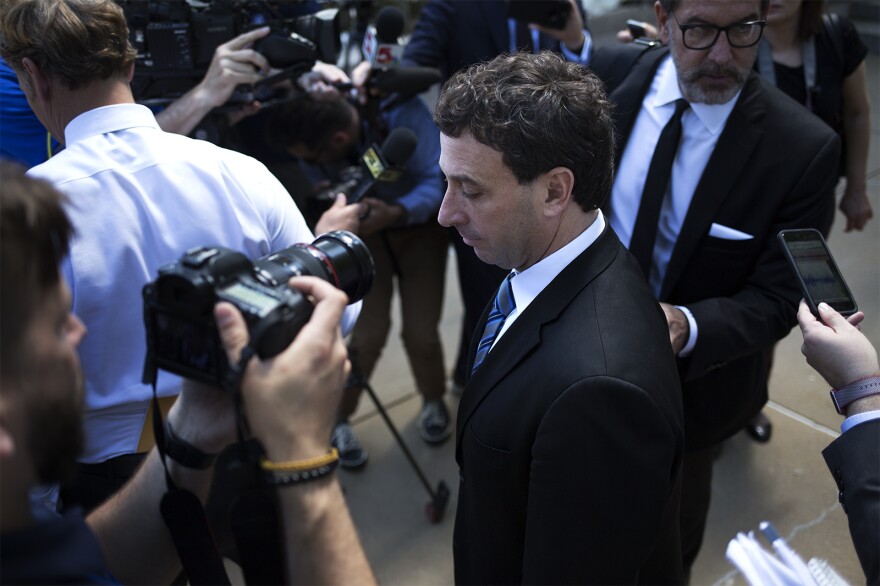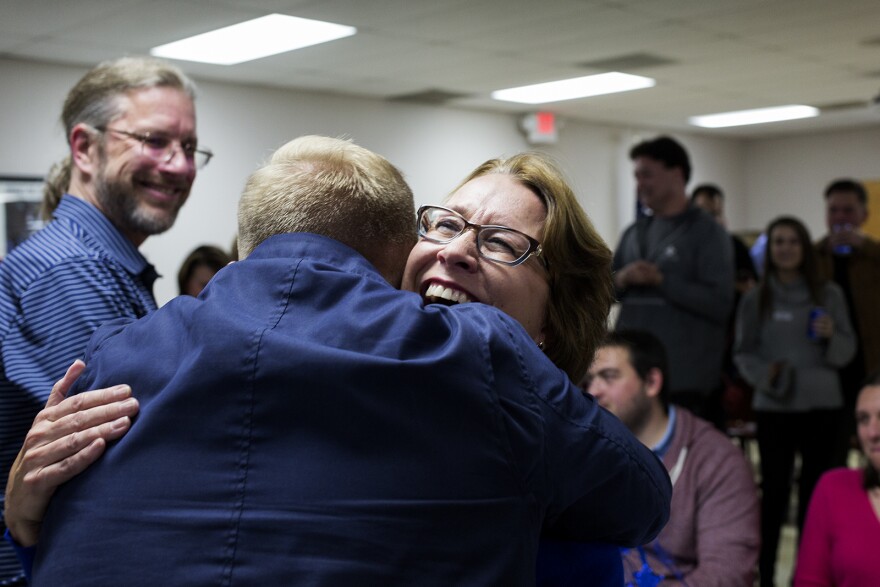When historians look back at Missouri politics in 2019, they may get whiplash from all the twists, turns, scandals and controversies.
These past 12 months brought seismic change to the St. Louis region, especially with the sudden collapse of St. Louis County Executive Steve Stenger’s administration and a nearly six-year effort to merge the city and county. In Jefferson City, Gov. Mike Parson dealt with a host of difficult policy issues — including economic development, Medicaid and abortion.
The 2020 election cycle likely will dominate the next 12 months in federal, state and local politics. And some of the events that occurred in 2019 could provide insight on the most important questions of 2020.
Will anything come out of the Board of Freeholders process?

One of the biggest regional stories of 2019 was the unveiling and rapid demise of Better Together. That proposal would have created a metro government overseeing St. Louis and St. Louis County — and consolidated a number of key governmental services. Ultimately, Better Together floundered in the face of bipartisan disdain over how the plan was going to a statewide vote — and an intense backlash among African American political leaders concerned about a dilution of black political power.
Loading...
When the smoke cleared over Better Together’s failure, the Municipal League of Metro St. Louis was able to gather enough signatures to launch what’s known as the Board of Freeholders. That 19-person body can recommend major changes to how services and governments work in the city and county. But that process has stalledsince reaching an impasse over who should represent the city on the board.
If St. Louis Mayor Lyda Krewson and the Board of Aldermen are able to come to some sort of agreement, one of the storylines of 2020 is whether city and county freeholders can come up with a plan that will find favor with voters. The Board of Freeholders doesn’t have a good track record in proposing ideas that have actually been implemented — so it will be worth watching if that trend changes in 2020.
Can St. Louis County truly move on from the Stenger era?

Many point to the downfall of St. Louis County Executive Steve Stenger as the death blow to the Better Together plan. He was supposed to be the all-powerful mega mayor in the metro government. But he instead resigned and went to prison for corruption, leading to the ascension of Sam Page to the county executive’s post.
Since Page took office, he’s devoted a lot of energy to changing staffing and policies that were put in place during Stenger’s tenure. That includes new people runningthe Department of Justice Services and serving on the St. Louis County Board of Police Commissioners.
But once 2020 hits, county residents will likely start caring less about Stenger’s shortcomings — and more about how elected leaders are dealing with tough issues. That includes figuring out how to increase county employee pay and re-establishing trust with the police department.
Will St. Louis County voters keep Page in office?

After the county council picked him to replace Stenger, Page announced he would seek to keep his county executive post by running in a 2020 special election. He’s on a collision course with County Assessor Jake Zimmerman, who has more money in the bank to spend on what’s historically an expensive campaign.
Whether Page remains in his post will have a lot to do with how he handles difficult issues. He’s faced criticism for how his administration dealt with now-Lt. Keith Wildhaber’s gay discrimination lawsuit that resulted in a nearly $20 million verdict against the county.
It will also be worth monitoring if Page’s good relations with the county council last through 2020. After all, the disconnect between Stenger and the council was a big warning sign of extreme turbulence throughout county government.
Is someone stepping forward in 2020 to take on Krewson?

St. Louis Mayor Lyda Krewson won’t be on the ballot next year. But she will be up for another four-year term in the early months of 2021. So it stands to reason that formidable challengers could make their campaign official at some point in 2020.
Krewson entered office after narrowly emerging out of a crowded Democratic primary, the real race in the city. She could face tough questions from voters about, among other things, whether she’s fulfilled 2017 promises to lower crime — and why she strongly supported the Better Together plan.
One of the key subplots in the run-up to this election is whether the black political community will rally behind a candidate or once again fragment among several contenders. That’s what happened in 2017 when Krewson was the only major white candidate to run against four African Americans.
Can Missouri lawmakers push through meaningful change in an election year?

Missouri lawmakers are headed back to Jefferson City in early January to begin the 2020 legislative session. And the big question is whether they’ll accomplish meaningful policy initiatives or fall into election year gridlock and posturing.
One variable is how Gov. Mike Parson was able to get the GOP-controlled Legislature to buy into much of his agenda during the 2019 session. He didn’t get everything he wanted. But there’s less on the table to accomplish after lawmakers enacted many of his workforce development and transportation proposals this year.
It’s not out of the question that legislators may tackle weighty policy issues that came to the forefront while they were out of session, including how large counties dealt with home assessments and how to regulate or expand gambling. House Speaker Elijah Haahr also noted that a plan to combat gun violence would be unveiled early in the session, though it’s unlikely that any major gun restrictions will be included.
Will Democrats reverse their slide in suburban and rural Missouri?

Parson will likely square off next year against Democratic state Auditor Nicole Galloway. And for Galloway to prevail, she’ll need to take back a lot of the terrain that her party has lost this decade in rural and suburban parts of the state. The math doesn’t work for a Democratic candidate to win statewide with just St. Louis, St. Louis County, Boone County and Kansas City.
Much of Galloway’s trajectory will depend on how voters feel about Parson’s performance and how good a campaign he’s able to run. But it will also come down to what Missouri voters think about the national environment. That may be why Parson and his GOP supporters are coming out so strongly against President Donald Trump’s impeachment: If Trump is still popular with Missouri voters, it will benefit Parson and the rest of the GOP ticket.
It will also be worth watching if Democrats can gain back some of the other statewide offices that Republicans hold, such as attorney general or secretary of state. It’s not going to be easy, since Missourians tend to re-elect statewide officeholders. The one caveat here is that Attorney General Eric Schmitt, Treasurer Scott Fitzpatrick and Lt. Gov. Mike Kehoe were all appointed to their posts — so they may not possess the usual power of incumbency.
How much more ground can Democrats gain in St. Louis County?

One of the only places in Missouri where Democrats have prospered recently is in St. Louis County.
Democrat Trish Gunby decisively won a special election in the 99th House District that had been Republican for decades. And Missouri Democrats are gearing up for an epic electoral bout between GOP Sen. Andrew Koenig and Democratic state Rep. Deb Lavender in the historically Republican 15th District.
While Democrats are in way too big a hole to recapture either the Missouri House or Senate, they could start to chip away at the GOP majorities by winning more seats in west St. Louis County. But they’ll also have to defend some of their hard-fought gains, both in places like the 99th House District and the 1st Senate District.
Will Congresswoman Ann Wagner withstand Democrat Jill Schupp's challenge?

State Sen. Jill Schupp is challenging Congresswoman Ann Wagner in Missouri’s 2nd District, which encompasses a big chunk of west St. Louis County. While that district is still GOP-leaning, Schupp will likely have backing from national groups like the Democratic Congressional Campaign Committee that provide money and organizational support necessary to win competitive races.
But Wagner is no pushover. She’s been involved in local, state and federal Republican politics for years and is renowned for her fundraising and campaigning abilities. And if Wagner is able to win decisively against Schupp, then that may help other candidates — including statewide contenders like Parson.
If Schupp makes it close or wins, then her success may aid people like Galloway, Lavender and Gunby.
How will voters approach high-stakes ballot initiatives?

Perhaps the most important long-term decisions Missourians make next year won’t necessarily be in races with candidates, but with initiative petitions that are expected to go before voters.
It’s increasingly likely that a bid to expand Medicaid will make it on the 2020 ballot, especially since it has more than enough money coming in from hospitals and politically active nonprofits. That issue will likely cast a shadow of sorts over the 2020 legislative session and the Parson-Galloway contest.
And it’s also a strong possibility that Missouri lawmakers will let voters decide whether to keep a new state legislative redistricting process. That system was a part of a multi-faceted proposal known as Clean Missouri that voters approved in 2018.
Many Missouri Democrats in particular like the new system, which places less emphasis on compactness, especially since that party is largely clustered in urban and suburban Missouri. Republicans see the new plan as a scheme to reduce their large majorities. And it’s not out of the question that both parties could direct a lot of money into deciding whether it stays or goes before redistricting gets underway in 2021.
Follow Jason on Twitter: @jrosenbaum
Send questions and comments about this story to feedback@stlpublicradio.org



